Walks around Staines
Staines, Runnymede, Chertsey etc. 24-28 Dec 2013
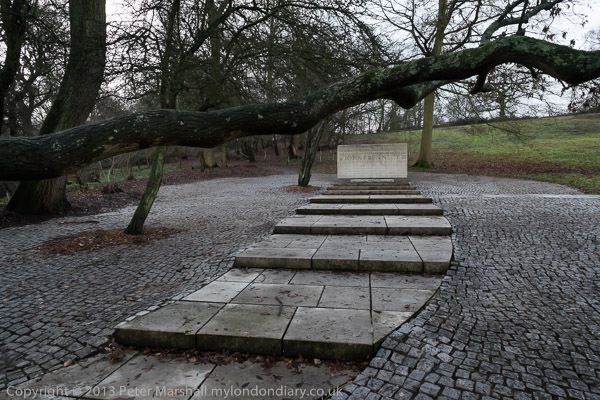
And we walked through a little bit of America on Boxing
Day
more pictures
My elder son came to stay with us over Christmas and as usual we went out for a number of walks together, and I was carrying my Fuji X-Pro 1 and took a few pictures. It wasn't always great walking weather, and we had to avoid some of the paths that flood easily and occasionally had to wade through some fairly deep puddles. One day it was raining so much that I stayed home while the others went for a walk. Most of the other days I took a few (and on one occasion rather a lot) of family pictures, which I won't post here, as well as eating and drinking too much.
On Christmas Eve Sam and I walked along the section
of the former railway line from Staines to West Drayton just north of the
Staines bypass, then tried to go on to Staines Moor from Moor Lane, but found
the path was badly flooded. I also found when I got home that I'd applied
some unexpected diffusion to a part of all the pictures with an unnoticed
finger print on the front of the lens. On Boxing Day
we all walked from Staines to Egham and then though the woods on Cooper's
Hill to Old Windsor for lunch. A couple of days later there was a rare
fine day and we walked from Staines to Thorpe, across the M3 and M25 and
up St Ann's Hill and then down into Chertsey.
more pictures
Reinstate Colombian Mayor Petro
Colombian Embassy, London. Tue 17 Dec 2013
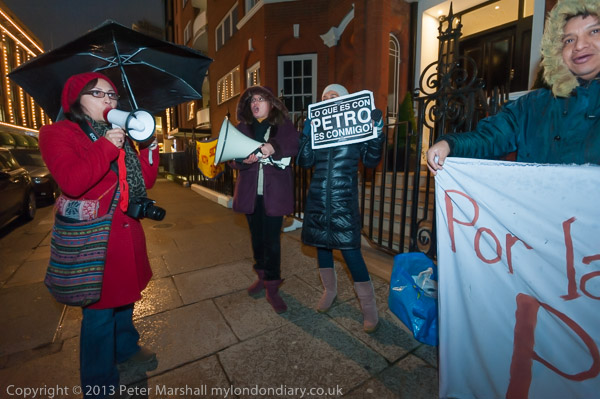
The protest started opposite the embassy in the
rain. Later it rained more.
more pictures
Colombians and other Latin Americans protested opposite the Colombian embassy in last night's rain demanding the reinstatement of the Mayor of Bogotá, Gustavo Petro, whose removal threatens the political left and the democratic process in Colombia.
The protesters say that the decision by the Colombian Attorney General Alejandro Ordóñez to remove the Mayor and ban him from holding public office for 15 years shows that the Colombian government is backing the interests of private capital and denying democracy in the country. It calls into question the whole participation of the political left and democratic forces in playing a part in the peaceful transformation of the country through elections.
Gustavo Petro is one of the leading figures in Colombian politics, and as Mayor of Bogota is often seen as holding Colombia's second most important elected office. The ban came after he had attempted to get the city to take over its waste collections from private companies, which Ordóñez said was a violation of free-market principles.
The ban comes as peace talks continue in Havana between guerrillas of the Revolutionary Armed Forces of Colombia (FARC) which seemed likely to be about to reach a successful conclusion, but is seen a a serious blow to the chances of reaching a settlement, which very much depends on FARC and opposition parties being given effective guarantees over their participation in democracy in the country.
Ordóñez is one of the fiercest opponents of the peace process. Petro has made it clear that he does not want his ban to hold up the search for a peace settlement, and is widely seen as a possible future left candidate for the presidency. There have been protests in Colombia against the ban, and it seems likely that even were the current appeals to fail, if the country returns to open democracy and peace he will be an important figure in its political future.
Petro, a former guerilla who gave up fighting for politics in the 1980s, remains in office pending the result of his appeal against the ban, and has attracted considerable support, even from many opposed to his policies, who see the sentence as excessive for what was a minor mistake in admimistration. The ban is seen by many as being more about his other actions, such as the banning of bull-fighting and support of same-sex marriages, which have angered right-wing conservatives such as Ordóñez.
The evening protest in London took place in rain, at times heavy which perhaps kept down attendance, though others were still arriving when I left around an hour after the protest had been timed to start. A police officer came over to talk to the protesters, asking if they would make less noise, and after a lengthy and good-natured discussion they agreed to do so. They suggested that they could protest more effectively but cause less disturbance to the neighbours if they were allowed to protest on the pavement outside the embassy rather than across the street, which seemed a reasonable suggestion, but one that was not acceptable to police.
The protest was called by the Movement of Colombian Migration in London and
supported by many other Latin American organisations in London and elsewhere.
It was continuing as I left, and I arrived late for my next meeting, having
been held up in heavy traffic. London by bus in a rainy evening rush-hour
is impossible, it would have been quicker (but much wetter) to walk.
more pictures
Harrods & IRA Bomb Victims Memorial
Harrods, Knightsbridge, London. Tue 17 Dec 2013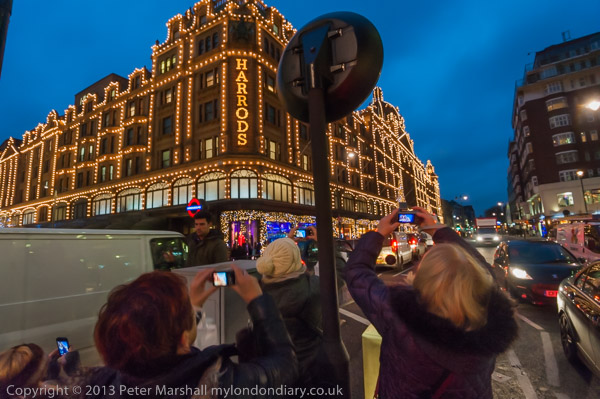
Four (or five?) tourists take pictures of Harrods at
night
more pictures
I was early for the Colombian protest which wasn't running to English time and had time to walk around the block and take a few pictures as some of them arrived and got themselves sorted out. On the east side of the building there are two memorials, one for police and the other for civilians, who were killed by the IRA bomb here on 17th December 1983, exactly 30 years ago. Around them on the anniversary were flowers.
It was around 5.15pm and tourists and shoppers were still filling the streets
around Harrods. On a traffic island in the Brompton Rd were at least half
a dozen with their cameras held up, and when one left another took her (or
his) place. I could only fit four into my picture, one with a phone and three
with cameras. I'm the fifth.
I walked around slowly, taking a few pictures (including one with 20 Big Bens)
as the rain got steadily thicker, arriving back at the Colombian embassy half
an hour after the protest was supposed to start. A couple of minutes later
it really did.
more pictures
Vigil for Chelsea (Bradley) Manning
St Martins, Trafalgar Square, London. Tue 17 Dec 2013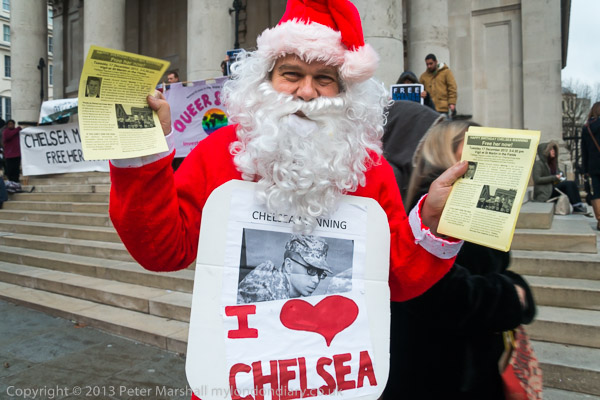
Santa hands out leaflets calling for the release of
Chelsea Manning
more pictures
A vigil on the steps of St Martin in the Fields in Trafalgar Square marked the birthday of Chelsea (formerly Bradley) Manning, jailed for 35 years for exposing US war crimes.
The 35 year sentence imposed on Chlesea Manning (formerly Bradley Manning) for copying US government e-mails to Wikileaks was clearly intended to deter other whistleblowers who might have have evidence of US war crimes, The sentence is considerably harsher than those imposed on soldioers found guilty of rape, murder and other war crimes.
Manning did the free world a service by disclosing details of mureder by US helicotpers in Iran, the cover-up of rapes in Afghanistan, drone strikes, US 'dirty tricks' in Haiti, Venezuala nad elsewhere, and other war crimes and behind the scenes manipulation.
Manning is not the only 'whistle-blower' to find themselves in trouble. The
leaflet being handed out by Payday men's network and Queer Strike who organised
the vigil also reminded people about several others. Julian Assange has been
locked away in the Ecuadorian embassy in London since July 2012; Edward Snowden
is in Russia where he fled after releasing large amounts of information to
newspapers; Jeremy Hammond was stitched up by the FBI and jailed for ten years
in 2011 after his hacking exposed the use of paid informants by intelligence
contractors Stratfor, and US journalist Barrett Brown, also linked with backed
information on Stratfor has been gagged by the Federal Court and faces over
100 years in prison.
more pictures
Staines Moor
Staines, Spelthorne. Sun 15 Dec 2013
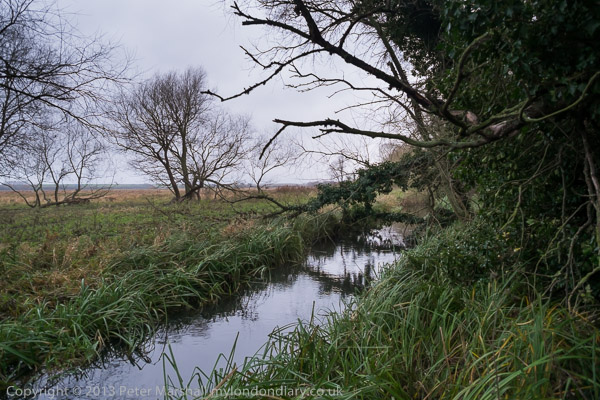
Bonehead Ditch - we crossed it on a fallen tree (not
the one in the picture)
more pictures
It was starting to get dark and raining slightly as we came out for a walk on Sunday afternoon. I'd only brought a camera because I wanted to try out my new 14mm Fuji-X lens - these were made with it on the X-Pro1. It makes it feel a better camera than the 18-55 zoom or non-Fuji lenses on adaptors.
But it doesn't stop the photographer making a mess of things, and I took
most of the pictures on too slow a shutter speed as I wasn't paying attention
and left the ISO at 400 even though it was very dark. So all of these were
taken with the lens wide open at f2.8, and when I stood still enough they
are bitingly sharp. Plenty of depth of field with the 14mm (21mm equiv) lens.
more pictures
Against PayDay Loans and Austerity
Brixton, London. Sat 14 Dec 2013
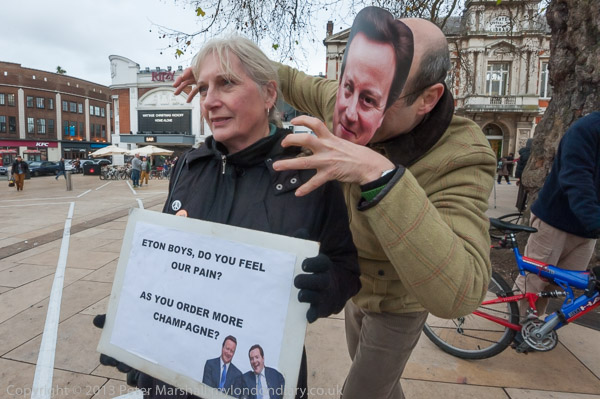
'David Cameron' figure about to strangle a woman with
an Eton Boys poster
more pictures
After protests in Eltham, Orpington, Lewisham and Wandsworth in the People's Assembly National Day of Action against the increasing dependence of millions on pay day loans and high interest credit, some came to Brixton to sing alternative carols.
Around 30 of those who had been protesting in local town centres in the morning came along for the protest in Windrush Square organised by South East London People's Assembly. This group has a "plain and simple goal: to make the government abandon its austerity programme. If it will not, it must be replaced with one that will."
A number of the protesters were members of Disabled People Against Cuts, which has several strong groups in the London area. Among them was Paula Peters, who made a powerful speech against the government policies which are pushing many into extreme poverty by cutting benefits. Along with failures and breakdowns in the welfare system - some undoubtedly deliberate - these are forcing many to have to rely on food banks to avoid starvation and to choose between eating and heating.
Paula has lost eighteen friends who have died before their time because of the cuts and the complete failure of millionaires in the cabinet to understand the precarious position of the low paid, unemployed and others who rely on regular payment of their benefits to survive. Loss of benefits because of an unfair ATOS test has been the final straw for far too many and food banks are overstretched because of administrative failures over paying benefits, and far too many arbitrary sanctions imposed on claimants, often as a failure to properly read or check paperwork.
Some of the mistakes get sorted, appeals against Atos testing are very often allowed, but sometimes by the time this happens it is too late for those affected. If you lose benefit or have it unreasonably reduced and can't afford fuel bills you have a far too high chance of death from hypothermia.
After the speeches everyone sang some alternative Christmas carols with new words to the traditional tunes from Mavis Cookm James Pettefar & Holly Teal of the South East London People's Assembly. Among my favourites was Poverty and Wealth (to the tune of: “God rest ye merry, gentlemen”) with the refrain:
For the rich there is comfort and joy,
comfort and joy,
But there’s little left for those that you employ
and 'Hark! The Evil Bankers Sin'. But perhaps what stood out most was Tory Hell (To the tune of ‘Jingle Bells’) with its chorus:
Tory hell, Tory hell
It’s always the same;
Infrastructure privatised
And someone else to blame
Tory hell, big cartels
Free market insane;
Blame it on the immigrants
That’s the Tories’ game.
and the revised version of 'We wish you a Merry Christmas' which summed up
the position of many with 'We just can’t afford Christmas, It’s
been a tough year!'
more pictures
'Elf Not Wealth' Anonymous Event
Trafalgar Square, London. Sat 14 Dec 2013
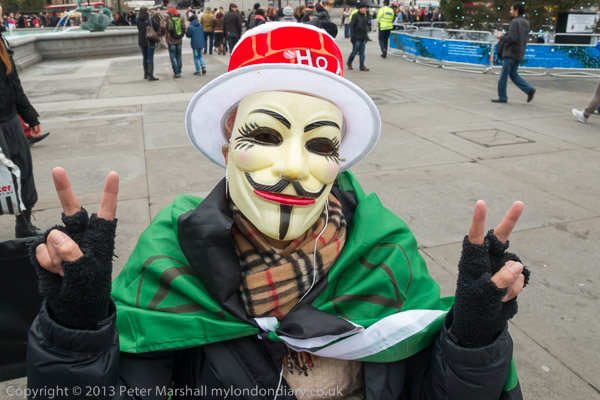
A woman sitting on a mobility scooter gives a double
'Victory' sign
more pictures
'Anons' met with bags of good, coats, hats and scarves in Trafalgar Square to walk among West End Xmas shoppers and give gifts to the homeless on the streets as a gesture against government austerity measures and corruption and corporate greed.
Most of those present when I met them in Trafalgar Square were carrying large bags of warm clothes and wearing 'Anonymous' masks. They had come to this 'family friendly, peaceful Christmas themed march' to give gifts to people on the streets and were intending to sing alternative Christmas carols while marching along Oxford St.
Heritage wardens in Trafalgar Square came over to question the protesters,
but left when they were told that they did not intend to protest there but
were just meeting up. I had to leave while they were still in Trafalgar Square,
waiting for some who had gone to take some of the warm clothing they had brought
to a a nearby centre for young people.
more pictures
Hunger Strike for Sikh Freedom
Indian High Commission, London. Sat 14 Dec 2013
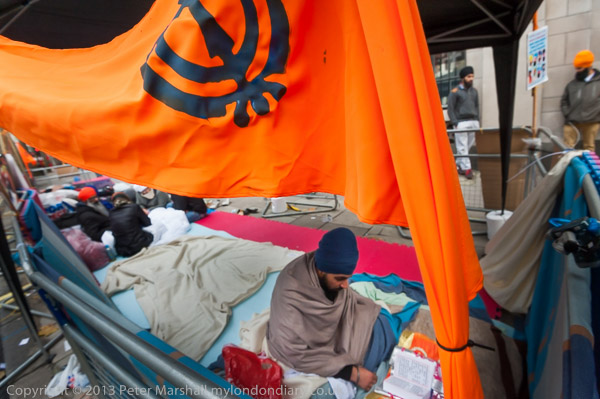
A man on hunger strike studies scripture under a Sikh
flag
more pictures
Sikhs camped outside the Indian High Commission in Aldwych on a 5 day hunger strike in solidarity with that of Gurbaksh Singh, on hunger strike since Nov 14th over the continued detention of Sikh political prisoners who have served their full sentence.
Sikh interests were sidelined at the partition of the Indian subcontinent at the end of British rule in 1947, and although promises were made about their fair treatment. Although only around 2% of the Indian population are Sikh, they are the majority in the Indian state of Punjab. At partition, most of the Sikhs who were living in the part of Punjab that was to be incorporated in Pakistan moved to India.
Sikhs since independence (along with other meteorites) have been subject to continued persecution, most notably in the 1984 invasion of the Golden Temple at Amritsar and the subsequent massacres and riots. The following years saw a ruthless campaign of suppression against Sikhs in favour of greater autonomy and in particular against those campaigning for an independent Sikh state, Khalistan, some of whom were involved in a military insurgency.
Many in the Punjab were arrested, and some given long jail sentences. At least six of those who have served the full term of their sentences are still being held more than five years later, with the Indian government refusing to release them. Others are held for years without ever getting to trial.
On November 14th, 2013 Gurbaksh Singh at Gurdwara Amb Sahib in Mohali began a hunger strike to publicise the continued detention and seek the release of Sikh prisoners. There was huge support for him across the Punjab, and from Sikh organisations around the world, although not from some Sikh leaders.
On Friday Dec 6th, Gurbaksh Singh was arrested in a midnight raid by Punjab Police, then taken to hospital before being taken to jail. On Monday 9th Dec he was released on bail in Chandigarh and returned to the Gurdwara Amb Sahib to continue his fasting.
In the UK, the The Sikh Organisation for Prisoners Welfare decided to have a group hunger strike in support of Gurbaksh Singh, with a relay of hunger strikers on liquids only for 12 or 24 hour periods for the month of December.
The hunger strikers in London have gained further inspiration from the example of Nelson Mandela who spent much of his life behind bars and was called a terrorist for standing up for freedom and against injustice and persecution.
The FSO (Federation of Sikh Organisations) UK have set up a camp outside
the Indian High Commission in Aldwych, and a 5 day hunger strike by a small
group began there on Tuesday. When I visited and took these pictures, the
hunger strikers had another two hours to complete and were in good spirits,
with a number of supporters also present, and more expected to arrive in time
to celebrate the end of the five days. Others there told me that there may
be other groups continuing 5 day hunger strikes there.
more pictures
Hizb ut-Tahrir Spokesman held in Pakistan
Pakistan High Commission, London. Sat 14 Dec 2013
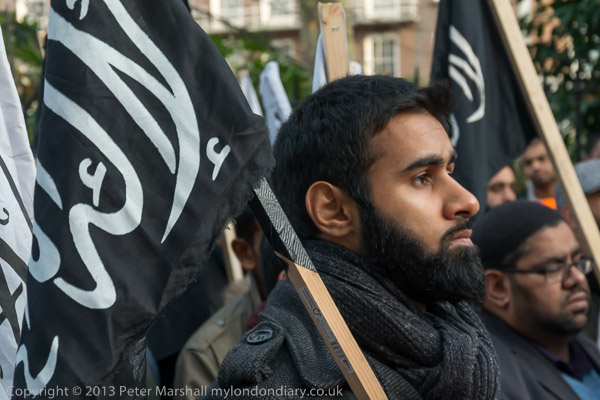
Men listen to the speeches calling for the release of
Naveed Butt and an Islamic Khilifat for Pakistan
more pictures
Muslim men and women took part in a Hizb ut-Tahrir UK protest at the Pakistan High Commission in Lowndes Square calling for the release of the Pakistan Huzb ut-Tahri spokesman Naveed Butt, abducted and held in secret by Pakistan security services since 11 May 2012.
Butt was bringing his children home from school on 11 May, and according to his his wife, as he reached home, "In front of my three innocent children and neighbours, they dragged him from the car and placed him in the typical white Suzuki high roof van used by ISI [Inter-Services Intelligence - the Pakistani security agency] and then ran away."
There were protests in the following days in Pakistan and abroad, including in London, and legal actions which led to the security services being demanded to present him at the Lahore High court. They failed to do so, claiming that they knew nothing about his abduction, and his whereabouts are still unknown.
According to one of the speakers, Naveed Butt was appointed as spokesman when Hizb ut-Tahrir first began its operations in Pakistan in 1999, and from then until his abduction was tirelessly calling for a strong Islamic Khilifat (caliphate) to replace the existing weak and corrupt regimes in Pakistan, as well as opposing the routing of supplies to NATO and US forces in Afghanistan through Pakistan.
Hizb ut-Tahrir believes in the power of thought and argument to convince people of the need for change; "thoughts" as one speaker said "can be more explosive than guns, more explosive than bullets, more explosive than Semtex." They reject also the Western-style democracy that backs Pakistan's weak and corrupt ruling elites, believing the superior thought of Islam and the unity of the Ummah will bring about a popular Islamic uprising and install a just and accountable Khilifat.
Under the regime of former Pakistani military ruler Pervez Musharraf (currently summoned to appear in court on a charge of high treason), Hizb ut-Tahrir was put on a list of illegal organisations because of its alleged terrorist connections. When they tried to challenge this in the courts, the government simply failed to come and contest the case; although the listing still stands, Hizb ut-Tahrir continues to function in Pakistan.
Rather than enforce this ban (which might not stand up in court), the security services resorted to more direct methods, with General Kiyani (who retired last month) allegedly ordering the ISI to carry out a series of kidnappings and the secret detention of Hizb ut-Tahrir members including Butt over his years in office (he retired last month.) The protest called for the release of all those detained by the security services.
Hizb ut-Tahrir has repeatedly accused Kiyana of being a stooge of the US, and they demanded an end to all military co-operation and logistic support of US and NATO forces by Pakistan.
The protest outside the Pakistani High Commission in Lowndes Square in London's Knightsbridge was attended by around 200 people, around a third of whom were women who stood as a group behind the men. In front of the men, facing the embassy were large orange banners with the messages ‘Free Naveed Butt: Call for real change for Pakistan, and ‘Pakistan needs real change: Pakistan needs Khilafat’. The event began with a recitation from the Quran, and after speeches by a number of men, including Dr Imran Waheed and Mazhar Khan from Hizb ut-Tahrir.
There were some loud chants against the US, against traitors in the government
and calling for the Khilafat now, and at one point the protesters turned down
their loudspeakers after complaints from some of the neighbours. There was
absolutely no sign of life inside the High Commission, although the green
flag with its white crescent and star was flying outside. The protest ended
peacefully with the prayer that Allah bring his help and victory soon.
more pictures
Cops Off Campus National Student Protest
University of London. Wed 11 Dec 2013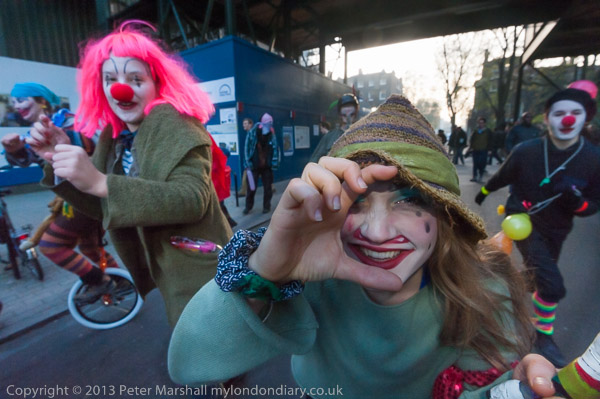
One of the clown army mimes taking a picture of me
more pictures
Police appeared to ignore todays large student protest today at the University of London, which passed off largely peacefully, with just a token breaking down of the gates of Senate House as protesters marched around and into the campus.
I was suprised as I arrived early for the protest not too see police vans parked in any of the nearby roads, which had been full of them for last Friday's emergency protest by students about police brutality in eviction the Senate House occupiers on Wednesday and a further protest over the 16 arrests on Thursday. Then police clearly had clearly set out to intimidate the students, but the tactic failed, with police failing to keep up with the protesters.
Last weeks incidents - with over 40 arrests - came after a number of other events both in London and elsewhere, particularly at Sussex University, where university management have called police onto the campus or gone to the courts to prevent or oppose student protests or apparently to harass students. At London University there are two major causes for student protest, the intention of the management to close down the University of London Union and the managements opposition to a living wage and decent conditions of employment - sick pay, holiday pay and pensions - for the low paid workers on campus. The '3 Cosas' campaign for the rights of these workers has united students and workers at all levels across the University.
I was with today's protest for around an hour and a half, and it appeared to have come to its conclusion when I left, with students sitting down outside SOAS and some dancing to the samba band. During that time I had not seen a single uniformed officer, though there were several I suspect of being undercover police in the large crowd of protesters.
It was a large crowd, as this was a well-advertised national protest, and it was too big to accurately estimate, perhaps several thousand. After the arrival of a crowd marching from nearby SOAS, there were speeches on Malet St outside the ULU, including from ULU President Michael Chessum and Vice-President Daniel Cooper, Sonia Chura from the '3 Cosas', Chris Baugh, Assistant General Secretary of the PCS, one of the Sussex students whose suspenison was lifted yesterday and several others.
The protesters then marched off down Malet St, at their front a 'Book Bloc' carrying large backed polystyrene foam shields with book titles, including George Orwell's '1984', particularly appropriate as the Senate House is said to have inspired Orwell's 'Ministry of Truth', and alongside it were Mandela's Long Walk to Freedom, Mary Woolstonecraft's 'A Vindication of the Rights of Women', E P Thompson's 'The Making of the English Working Class' and other classics.
When the march reached the east gates to Senate House in Russell Square the protesters stopped outside them, and after a few minutes the protesters carrying the giant books and some of the black bloc pushed forwards to the gates. They put the books up against the gates and then put their weight behind them, pushing them forward time and time again. A couple of protesters got over the gates and started to pull from the other side to help. Eventually the gates or their chains gave way, the gates opened and protesters surged forwards into the car park.
Inside, some made their way to the doors of the Senate House, which were locked, while others moved rubbish bins and temporary fences to clear a way towards SOAS.
After a few minutes the students made their way back to Russell Square and continued the march. The only damage appeared to be to the gates. The invasion was merely a gesture, and perhaps a question to the management. Why does a university need locked gates around its buildings?
The marchers continue up Thornhaugh St and then across into Torrington Square
and down towards SOAS. For a while it looked as if they might go back to the
Senate House, but then most or all of them moved towards SOAS, where the samba
band was playing and sat down, stood around or danced.
more pictures
Human Rights Day Candlelit Vigil for Syria
Syrian Embassy, Belgrave Square, London. Tue 10 Dec 2013
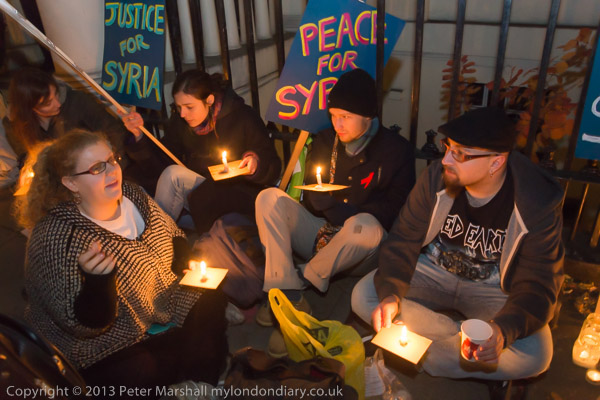 People
hold candles at the vigil on the pavement in front of the embassy
People
hold candles at the vigil on the pavement in front of the embassy
more pictures
On the evening of International Human Rights Day, the Syria Peace & Justice group held a candlit vigil at the Syrian Embassy, calling for an urgent end to conflict to address the desperate humanitarian situation there.
The vigil aimed to raise awareness of the desperate situation in Syria, and to call for:
- All Syrian and foreign parties to urgently address the desperate humanitarian situation and end all human rights abuses without further violence;
- All foreign actors to stop fuelling the conflict through supplies of arms and ammunition, troops and military financing;
- An inclusive, Syrian-led peace process;
- Political prisoners and arbitrarily-detained persons on all sides to be released immediately;
- The UK and other countries to accept their fair share of refugees;
Full accountability for war crimes and other human rights violations committed by all sides.
Those taking part wanted to express their solidarity with Syrian activists
working non-violently for peace, freedom, human rights and social justice
in Syria.
more pictures
Against Sex Segregation in Universities
Tavistock Square, London. Tue 10 Dec 2013
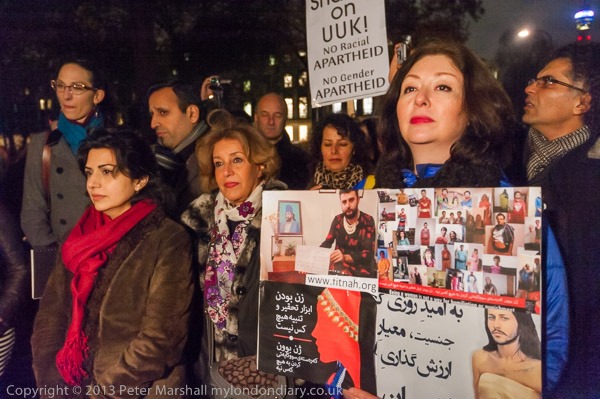
Maryam Namazie holds a poster at the event
more pictures
A rally at the Universities UK office opposed their guidance, supported by the NUS, that forced segregation of men and women in audiences at university talks by visiting speakers is not discriminatory if both sexes are treated in the same way.
The protest on International Human Rights Day at against the guidance was supported by many activist groups and campaigners for equality and the speakers were expected to include Pragna Patel of Southall Black Sisters, Maryam Namazie from Fitnah and One Law for All, Anne-Marie Waters of the National Secular Society, Julie Bindel of Justice for Women and Erin Saltman from the Quilliam Foundation, as well as comedian Kate Smurthwaite.
The petition against the guidance has already attracted around 8,000 signatures including A C Grayling, Peter Tatchell, Polly Toynbee and Richard Dawkins among the initial signatories. It includes the statment:
We, the undersigned, condemn the endorsement of gender apartheid by Universities UK. Any form of segregation, whether by race, sex or otherwise is discriminatory. Separate is never equal and segregation is never applied to those who are considered equal. By justifying segregation, Universities UK sides with Islamist values at the expense of the many Muslims and others who oppose sex apartheid and demand equality between women and men.
Around a hundred people turned up for the protest and listened to the speeches
in a dark area at the north end of Tavistock Square. Many were from humanist,
atheist or secular groups, as well as campaigners for women's rights, and
the speeches I heard were for equality and against any concessions to particular
religious beliefs, particularly those that were clearly irrational.
more pictures
Human Rights Day Pilgrimages for Syria
London, Tue 10 Dec 2013
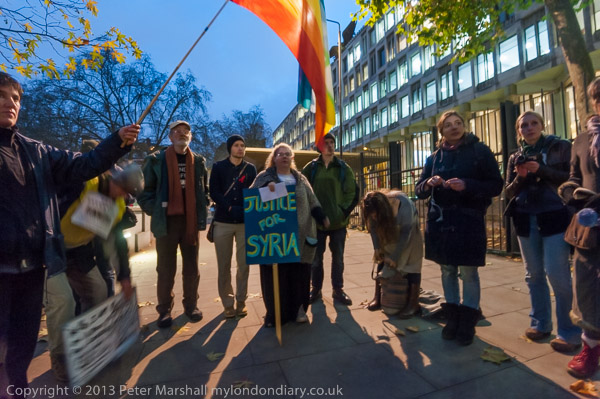
Pilgrims outside the US Embassy
more pictures
On International Human Rights Day, a Peace Pilgrimage for Syria visited the key embassies of Russia, Israel, Iraq, Kuwait, Iran, France and China and Downing St and the Foreign Office on the way to a vigil at the Syrian Embassy.
The Peace Pilgrimage for Syria was organised by the Syria Peace & Justice group and was split into two groups, one starting at the UN High Commission for Refugees office in the Strand, and the other in Kensington. Between the two groups they walked to visit the embassies and offices of the most important countries and bodies involved in the Syrian conflict.
The aim of the pilgrimage was to raise awareness of the desperate situation in Syria, and to call for:
- All Syrian and foreign parties to urgently address the desperate humanitarian situation and end all human rights abuses without further violence;
- All foreign actors to stop fuelling the conflict through supplies of arms and ammunition, troops and military financing;
- An inclusive, Syrian-led peace process;
- Political prisoners and arbitrarily-detained persons on all sides to be released immediately;
- The UK and other countries to accept their fair share of refugees;
- Full accountability for war crimes and other human rights violations committed by all sides.
They also wanted to express their solidarity with Syrian activists working non-violently for peace, freedom, human rights and social justice in Syria.
Both groups were small during the early afternoon, with a few more joining them at the US embassy bringing the total up to around 20. Between them before reaching Grosvenor Square the deputations had visited the Russia, Israel, Iraq, Kuwait, Iran, France, China, Russian, Israeli, Iraqi, Kuwaiti, Iranian, French and Chinese embassies on their way to the US embassy, and had been able to leave their letter calling for an end to the Syrian conflict in person at some of them. Others had suggested that they post it, claiming that acception letters posed a security threat, while a few simply failed to answer their doors, or promised to take the letter but left the group waiting on the steps and failed to do so. Their statement had also been delivered to the UNHCR offices in the Strand, 10 Downing St and the Foreign and Commonwealth offices.
After a short meeting to discuss progress, a group of the protesters held a brief protest outside the front of the embassy reading out ther statement calling for a just end top the conflict in Syria and an end to foreign interference.
I left the 'pilgrims' at the US embassy, frome where they were going to take
their message to the Qatari, Saudi, German and Turkish embassies on their
way to the Syrian embassy where a candlelit vigil had been planned. The Turkish
embassy had promised to they would hold a meeting with a small group.
more pictures
Tibetans Walk Backwards for Human Rights
Westminster, London. Sat 7 Dec 2013
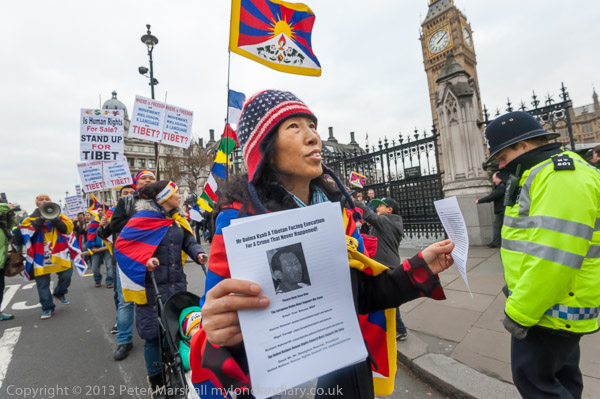 Tibetans
march backwards from Old Palace Yard to Downing St past the Houses of Parliament
Tibetans
march backwards from Old Palace Yard to Downing St past the Houses of Parliament
more pictures
Tibetans and the supporters walked backwards in protest to highlight the deteriorating situation in Tibet and to show their anger and disgust at China being given a seat on the UN Human Rights Council despite its human rights abuses in Tibet.
Last month the UN general assembly filled 14 vacant seats on the UN Human Rights Council and among the new members were several with appalling domestic human rights records, most notably China. China has repeatedly denied UN human rights inspectors access to the country and since it applied to join in the summer has further restricted internet access, imprisoned numerous human rights campaigners and tightened its already draconian security measures in Tibet. As well as its own terrible human rights record, China has also voted at the UN against resolutions over human rights violation in other countries, including Sudan, Iran, Syria and North Korea.
Since the invasion of Tibet in 1959, China has carried out a systematic programme to eliminate Tibetan culture, attempting to get rid of the Tibetan language and religion and killing 1.2m Tibetans through imprisonment, torture, starvation and executions. Many of the monasteries have been closed down, and severe restrictions placed on the activities of monks and nuns. Some Tibetans allege that some of the remaining monasteries are retained only as tourist attractions, with soldiers dressed as monks. A UN report in 2008 concluded that the use of torture was widespread and routine.
China has carried out vast settlement programmes in Tibet, giving incentives to Han Chinese migrants to settle in Tibet, resulting in Tibetans becoming a small minority in many areas. Tibetans are required to wave Chinese flags at government organised cultural events.
In September this year a Tibetan man, Dayang, shouted out Tibetan freedom slogans at a culture show at Driru Dzong, and along with others was arrested. Tibetans were ordered to fly Chinese flags on their houses on October 1, the National Day, and those who failed to do so were arrested. Other Tibetans marched to the police station to protest, and police opened fire on the unarmed crowd, killing 4 and wounding over 60. Dayang was badly injured by torture and beatings and sentenced to two and a half years in jail. Tibetans in the area had their mobile phones confiscated and internet access denied, and the area was placed under martial law, with armed police monitoring movements and checking identity documents, making some 40,000 Tibetans in the area virtually prisoners in their own homes.
Driven to desperation, over 130 Tibetans have set fire to themselves in Tibet. One of the cases highlighted by the protesters was that of Dolma Kyab, whose wife Kunchok Wangmo died when she set fire to herself on 11 March 2013. The following day he was arrested and charged with her murder, and after being interrogated and tortured was sentenced to death in August.
The protesters were handing out a flyer urging people to e-mail their MPs, MEPs and the President of the UN Human Rights Council to get the council and the EU to put pressure on China to review his case and not to execute him. Many other relatives of the self-immolators have been accused of abetting and encouraging self-immolation and sentenced to terms in prison.
The protesters also expressed their disgust at the recent visit to China
by David Cameron, and his soft-pedalling of the human rights issues in his
bid to increase trade with China. But Tibet has been failed by the rest of
the world since the Chinese Communists first invaded in 1949 and forced the
Tibetans to to sign an agreement with them that eventually led to the Lhasa
uprising and the Chinese takeover in 1959.
more pictures
Photographers Support Photography
South Bank Centre, London. Sat 7 Dec 2013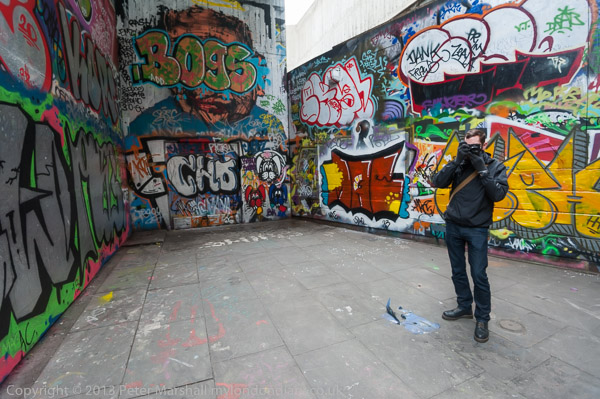
A photographer in the skate area in the South Bank undercroft
more pictures
A group of photographers came to London's South Bank Centre today after an incident on Tuesday when security guards stopped a photographer photographing the skateboard area. Later the Southbank Centre tweeted an apology to the NUJ.
On Tuesday this week, respected documentary photographer Marc Vallée, a fellow member of the London Photographers' Branch of the NUJ, was stopped by security guards while photographing the skateboarding area below the London Southbank Centre. He had just finished photographing tthe area and was taking a few pictures on his iPhone for Instagram when he was confronted by three security guards.
“Being told I could not take pictures with a smartphone was a truly bizarre experience. I showed my UK Press Card and explained what I was doing and why. After a surreal exchange of views on photographers’ rights, the guards called the head of security. Around ten minutes later they walked away without explanation or apology.”
The incident was followed up with a report on the NUJ LPB web site, and tweets began to fly condemning the action by the security guards. Later in the day the Southbank Centre tweeted:
“Visitors are welcome to take photos on site. Our temp security guards did not understand this. Apologies for any inconvenience”
Security guards - even or perhaps especially temporary ones - should be aware of the attitude of the organisation they are working for to photography in places open to the public, where generally there are no restrictions on either photography for personal use or for journalistic purposes, although a licence may well be required for commercial photography or filming.
It is perhaps another example of the problems of organisations outsourcing vital functions rather than employing staff themselves. The security guards were obviously inadequately trained for the role they were being asked to perform - not a criticism of the individuals but of the typically poor management of outsourcing companies, of which there has been many well publicised examples in the past years. Probably the workers concerned are ill paid and have poor work conditions, enabling the companies who provide them to make large profits.
The skateboarding area is controversial, with the Southbank Centre management wanting to close it down despite it attracting many visitors who come to watch and take photographs. They want to use the area for more restuarants and shops which will provide an income.
The Undercroft area has been used by skateboarders for over 40 years, becoming known as the birthplace of British skateboarding and has been the breeding area for some of the world's best skateboarders and BMX riders as well as some very talented graffiti artists. It is the oldest recognised and still existing skateboarding space in the world and many see it as a vital part of our recent national heritage, and something worth preserving, and there seem to already be plenty of shops and eating places fleecing the tourists. A petition on 'Change.org' by 'Long Live Southbank' to save it has so far attracted over 66,000 signatures.
And while the decorative graffiti on the Undercroft may not be great art, nor to everyone's taste, it greatly enlivens the rather drab brutalist concrete 'béton brut' that was in architectural vogue when the South Bank centre was built. This too isn't to everyone's taste, but I think it would be unfortunate to completely hide it under shopfitter's tat. As the National Theatre nightly shows, with appropriate lighting it can have a certain magic, and here in the dimly lit spaces of the Undercroft I think the bright and varied paint does a grand job too. I'd certainly not trade it in for a row of shops.
There is an alternative area which the Southbank Centre say is being offered to the skateboarders, but apparently the planning application is not for a skate area but for something much more general, an arts space, and there is no guarantee that it would be available for skateboarders in the future. The campaign to save the Undercroft by 'Long Live South Bank' has received unprecedented public support
Around 20 people, including a number of professional photographers took up
the offer of Marc Vallée and Long Live Southbank to take an informal
photography walk around the Southbank following the incident and the Southbank
tweet. I was able to join them briefly at the start of the guided tour in
the skate area.
more pictures
'Cops Off Campus' Protest Police Brutality
Bloomsbury, London. Fri 6 Dec 2013
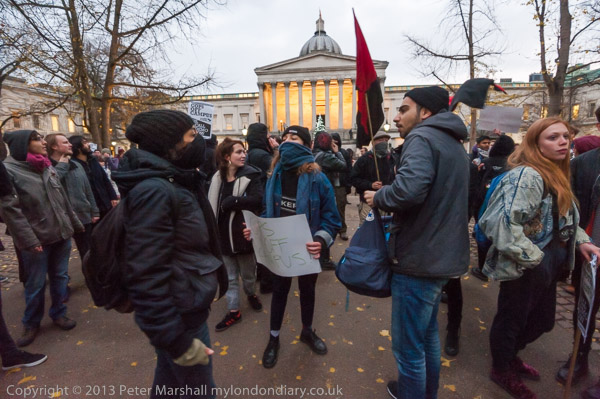
Students went into UCL when police approached, then decided to head back towards
SOAS
more pictures
Police attempted several times to kettle a large group of students protesting following the forcible removal by police of students occupying the Senate House yesterday. The students made a tour of university sites in the area before returning.
Relations between the University and its students at London University appear to be at breaking point as the University tries to ban protests on the campus and brings in large numbers of police. Today there seemed to be police vans down every side-street in the area as students assembled on the pavement outside the University of London Union in Malet St.
Today's protest was called after a brutal assault by police on students who had occupied Senate House for a few hours yesterday, in which a number of students were arrested, including the Editor of the student newspaper and a legal observer. That protest had been about the privatision of student fees, but there are a number of other issues, including the intention of the University to close down the student union. As well as disputes between university and students, there are also those between the university and staff who work there, and in particular the low paid workers - cleaners, security staff and catering staff - who have been campaigning for several years for a living wage and also want proper sick pay, holiday pay and pensions. Students and many academic staff have shown their support for this campaign for three things, the '3 Cosas'.
Today's protest was intended to be an entirely peaceful and orderly march around some of the various sites of the university in the area to the west and north of Russell Square, but the police seemed to have other ideas.
After a few short addresses outside ULU about yesterday's events and an outline of what was planned for this protest, the students set off down Malet St to stop outside the locked gates of Senate House. Here there was a lot of shouting of 'Cops off Campus!' and a few other slogans. The students then set off intending to go around the block, but their path was blocked by around 30 police officers across the constricted end of Malet St. A few students who tried to walk through the gaps in the line were thrown roughly backwards.
The students turned round an could see another line of police at the other end of Malet St, as well as more blocking the only side-turning away from the university campus. They decided to go onto the campus, walking past SOAS and out onto Thornhaugh St. There they turned up into Woburn Square and then turned to make their way into UCL, only to find the gates from Torrington Place were locked and guarded by security. Instead they continued along Gower St, speeding up when they saw a group of police coming up behind and rushing into UCL.
There the leaders of the protest held a brief discussion and decided to make their way through the back streets and return to ULU, rather than let the police block their exit from UCL. By now they were marching along busy roads and both they are the police - with officers and vans - were causing some disruption of traffic.
I'd had enough of walking by now and took a short cut back to arrive back at about the same time as the students, and watched them going into Torrington Square in the centre of the university, then decided it was time for me to go home.
I found it hard to see any reason for the large police presence and stopping
them walking into Montague Place as they wanted. It did seem an incredible
and pointless waste of public money, and it resulted in more inconvenience
to the public than if the event had not been policed at all.
more pictures
Bereaved protest at CPS Failure
Southwark Bridge, London. Fri 6 Dec 2013
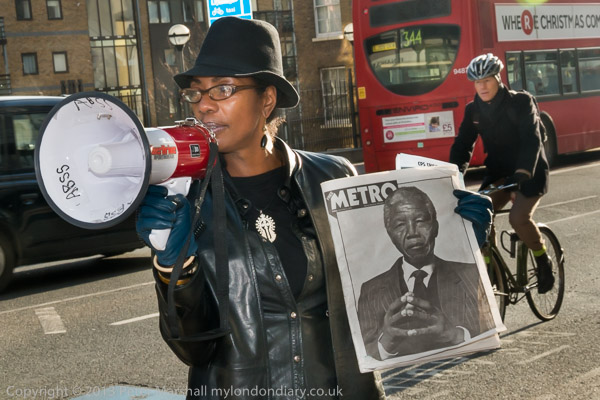
Marcia Rigg started her speech with a tribute to Mandela
more pictures
Families whose loved ones have died in custody protested otuside their offices in Rose Court at the failure of the Crown Prosecution Service to successfully prosecute police officers and others over the deaths. Since 1990 there have been 1433 deaths and not a single conviction.
Many of those at the protest were relatives and friends of people who have died as a result of actions by the police, prison officers or security guards. None of them have as yet seen justice over these deaths.
There are many other families too in a similar situation, and the great majority of them are black. The last successful prosecution brought against a police officer was for involvement in a black death in custody was in 1972, after the death of David Oluwale in 1969. Police officers have been prosecuted for several other black deaths in custody - Joy Gardner, Christopher Alder and Mikey Powell - but none was successful.
Many of the others are still waiting for the Crown Prosecution Service to
make decisions on whether to prosecute those involved. The standard response
from the CPS is that there is ‘not enough evidence to prosecute’,
often because there has not been a proper investigation of the cases from
the start. Often the police involved are simply not questioned, and in some
cases they refuse to answer questions.
more pictures
Tributes to Mandela
London, Fri 6 Dec 2013
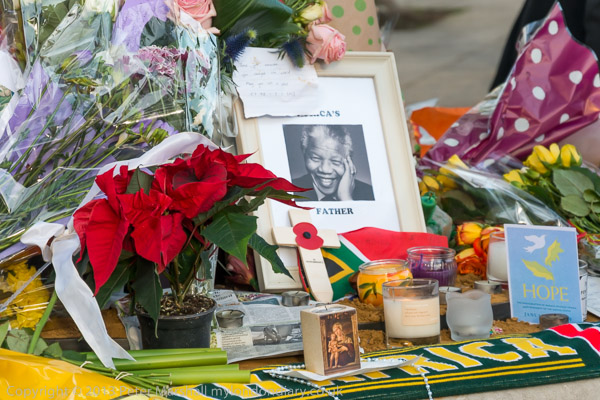
Flowers, messages and photographs at South Africa House
and the Mandela statue in Parliament Square
more pictures
People brought flowers to the Nelson Mandela statue in Parliament Square
and to South Africa House in Trafalgar Square, where a long queue waited patiently
for several hours to sign a book of remembrance in the High Commission.
more pictures
EDL Protest Supports Marine A
Downing St, London, Fri 6 Dec 2013
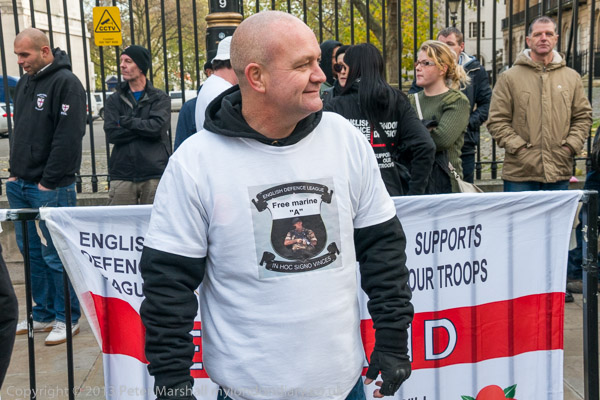
EDL protesters think Marine A should not have been charged
and call for a lenient sentence
more pictures
Around 50 EDL supporters protested opposite Downing St on the day that 'Marine A', Sergeant Alexander Blackman, was to be sentenced. They wanted a minimal sentence, arguing that he acted under extreme pressure and that his victim was a terrorist.
The EDL had hoped to have a large protest over this, suggesting perhaps 500 might attend. In the end there were a few under 50 while I was there, and the protest lacked any real conviction, with virtually nothing to tell anyone why they were there. There were no placards, just the flags on the outside of the pen, mainly of few of the usual EDL flags, with a couple claiming to support our troops. I heard one desultory chant in support of 'Marine A', but it was not taken up. There were a couple of people with the slogan 'I support Marine S' on their t-shirts, but the rest seemed fairly standard EDL flags and sweatshirts with the EDL logo and the message 'No Surrender'. Among the flags was one for the 'Taliban Hunting Club', with a skull with red eyes inside a gunsight and crossed guns, which seemed in particularly poor taste for this event.
I doubt if there are many serving soldiers who would wish to see the Geneva
conventions disregarded, and wonder what support if any this protest would
have from serving soldiers, many of whom have condemned strongly the cold-blooded
killing of a prisoner by Marine A and called for an appropriate sentence.
more pictures
PMOI continue Hunger Strike
Grosvenor Square, London. Thu 5 Dec 2013
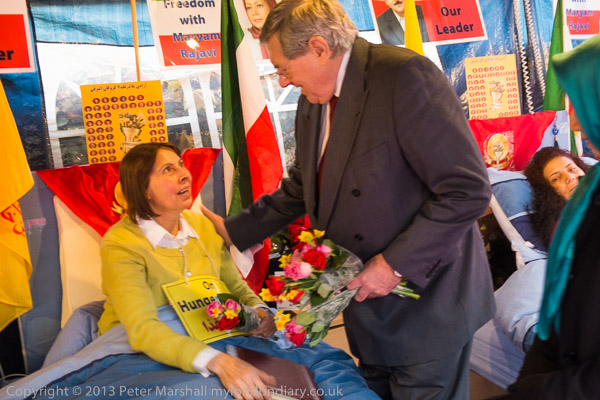
Brian Binley MP visits the People’s Mojahedin Organization of Iran (PMOI)
on their 96th day of hunger strike
more pictures
Brian Binley MP visited the hunger strikers of the People’s Mojahedin Organization of Iran (PMOI) on their 96th day at the US embassy for the release of 7 hostages held by Iraq since the September 1 invasion of Camp Ashraf.
The PMOI, also known as Mojahedin-e-Khalq (MEK), a leftist group formed in Iran in 1965 was one of the groups which took part in the 1979 revolution which ousted the Shah, but soon fell out with Ayatollah Khomeni and the Islamic Revolutionary Guards, and after an armed struggle was given refuge across the border in a camp in Iraq by Saddam Hussein.
When the US invaded Iraq they attacked the camp before coming to a ceasefire agreement with the PMOI. They agreed to give up their considerable arms (including 19 Cheftain tanks) and the 5000 PMOI members were given protected persons status by the US under the Fourth Geneva Convention in Camp Ashraf, a refugee camp which was guarded by the US miilitary. The PMOI also became the main party in the Iranian parliament in exile, the National Council of Resistance of Iran (NCRI), which is based in Paris. Neither the EU nor the US now regard the PMOI as a terrorist group.
When the US withdrew from Iraq the camp was transferred to Iraqi control. Since then there have been several major attacks by Iraqi security forces. The first in July 2009, killed 11 and injured over 500, with 36 being arrested, and only released near to death after an extended hunger strike. Further attacks came in October 2010, January 2011 and April 2011, when 36 were killed and 320 injured. On Feb 9, 2013 the camp was attacked by mortars and rocket, with at least 7 deaths. The PMOI appealed to the US and the UN Secretary General for help, but with no effect.
The invasion by Iraqi forces ordered by Iraqi Prime Minister Nouri al-Mailki on 1 Sept left 52 of the PMOI dead, and seven were taken as prisoners. They are still held in the Baghdad Green Zone in Iraq despite calls by a hundred Iraqi MPs for their release.
The hunger strike in a camp in front of the US embassy in Grosvenor Square, London is one of several organised by the PMOI, including at Camp Ashraf and by Iranians in Geneva, Berlin, Ottawa, Melbourne and London. It was the US who guaranteed their safety and gave them protected persons status, and so they hold the US responsible for protecting them. They also argue that the US is the major backer of the Iraqi regime and urge them and the UN to make urgent representations for the release of the prisoners.
This was the 96th day of the hunger strike, and there were five women who were lying in beds, although others and the several men on hunger strike were still sitting up and walking around. They all welcomed a visit from Brian Binley, Conservative MP for Northampton South, who talked to each of them briefly and brought them flowers. Several showed him some of the many photographs they have around, some of them of those who have been killed or injured, as well as pictures of their family members. After he had spoken to all those on hunger strike, a rally began and he spoke about the injustice and the lack of interest shown by many politicians both in the UK and in other countries to the failure to protect the PMOI and the many deaths and the 7 hostages currently held in Iraq.
After his speech he was presented with a bouquet and the rally continued,
but I had to leave.
more pictures
Release Shaker Aamer
Grosvenor Square, London. Thu 5 Dec 2013
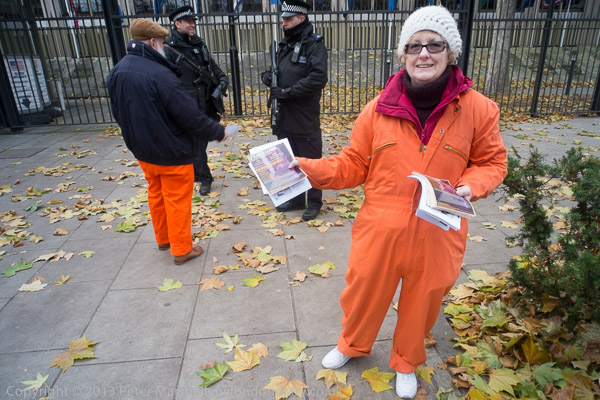
Police have got friendly with the protesters who are
here every month
more pictures
Protests at the US embassy contunue against the detention for over 12 years of London resident Shaker Aamer, still held in the Guantanamo Bay prison camp despite having been cleared for release under both Bush and Obama administrations.
Shaker Aamer was in Afghanistan with his family working for a Muslim charity when the US invaded the country. He was kidnapped by Afghan bandits who claimed he was a terrorist to sell him for bounty to the US authorities. After several months of toruture in Afghanistan, some in the presence of British agents, he was illegally rendered to the newly established Guantanamo prison camp in early 2002.
Like most of the prisoners at Guantanamo - and there are 164 still there - he has been and still is the subject of regular ill-treatment, beatings and torture. Around a dozen of the prisoners are thought to stil be on a hunger strike that started early in the year, and are regularly tied down and forcibly fed though a tube inserted through their nose.
Aamer has a wife and family in London, living in Battersea, close to the site of the new US embassy now being built. His youngest child was born a few months after his arrest and has never seen his father. Aamer's health is declining because of his conditions and treatment, and he is suffering from a partial loss of sight. He has been kept under long periods of solitary confinement.
The reluctance of the US authorities to release him is thought to be because of the evidence he would give if freed against both the US and UK agents involved in his torture. Although both this and the previous government have asked the US to release him, there are suspicions that they have failed to press strongly on his behalf. It is thought that the US would like to return him to his country of birth, where he would probably be imprisoned and never heard of again. He was only given resident status in the UK because there was good reason to assume that it would be unsafe for him to return.
In the latest of a continuing series of monthly demonstrations outside the
US embassy for his release that began around ten years ago, a small group
turned up with banners and leaflets at the embassy at noon. Police who have
got to know some of them over the years came to talk to them briefly as they
handed out leaflets to people walking past. The regular protests are a reminder
to the embassy staff that the US needs to shut Guantanamo, send home the prisoners
(or charge and try those few there is evidence against and send them to jail)
and end what the protesters and most of the rest of the world regard as the
shame of Guantanamo.
more pictures
top of page
All pictures on this section of the site are Copyright © Peter Marshall 2013; to buy prints or for permission to reproduce pictures or to comment on this site, or for any other questions, contact me.

